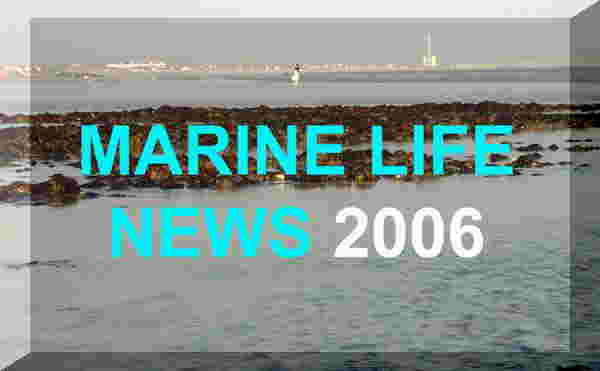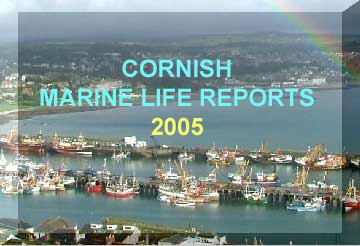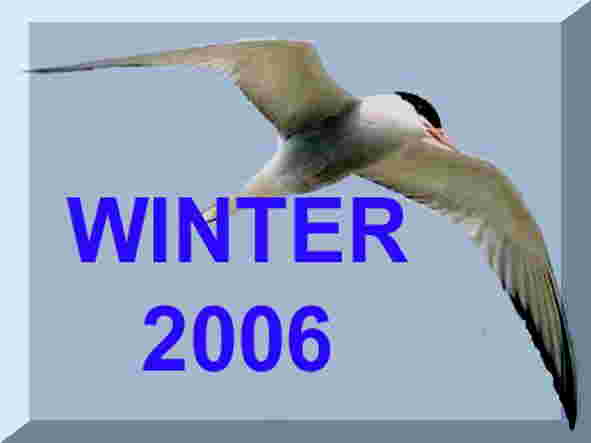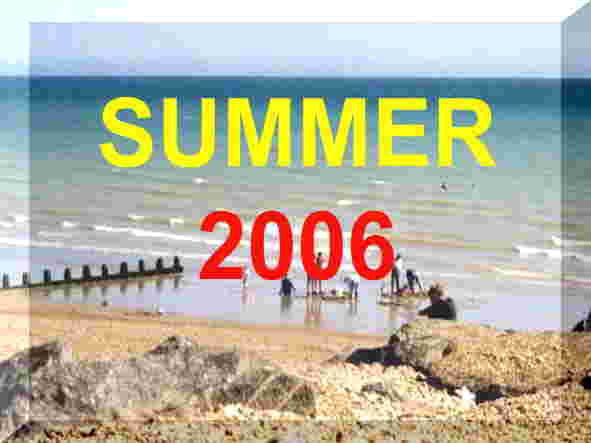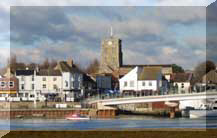WILDLIFE
REPORTS
25
June 2006
Martin
Elliot and myself have recorded large numbers
of Basking Sharks, Cetorhinus
maximus, off West Cornwall in perfect
sea conditions throughout the day. Because of movement between the morning
and evening it is hard to be exact on numbers but involved a minimum of
60 animals and a maximum of 100.
BMLSS
Basking Sharks
18
June 2006
An
exceptionally large European Lobster,
Homarus
gammarus, was caught by Louie
Smith, aged 16, off Deal
pier in Kent. It weighed 5 kg (11 lb
3 oz).
BMLSS
Lobsters
17
June 2006

Amidst
so much excitement that the camera could be found immediately, a three
metres long (including the sword)Broad-billed
Swordfish,
Xiphias
gladius, swam past our dive boat off
the south coast of Devon, off Teignmouth
(near the wreck of the Galicia).
BMLSS
Swordfishes
15
June 2006
The
River
Walks TV company with Charlie Dimmick
filmed on Lancing beach (at the Shoreham end near Widewater),
referred to as Shoreham-by-Sea, featured shrimping
with Peter Talbot-Elsden
(British Marine Life Study Society).

The
documentary focuses on the River Adur and will be broadcast in October
2006.
12
June 2006
A
Ray's
Bream,
Brama
brama, was caught and landed in an eel-bow-net at Skalderviken,
south-west Sweden by Hasse Edelin. The
fish measured 53 cm and weighed 1.5 kg.
 |
Hasse
Edelin with the Ray's
Bream,
Brama brama.
|
There
have been several reports of this pelagic fish washed up dead on North
Sea coasts over the winter of 2005-6.
Discussion
and Extra Information
10
June 2006

Adur
was one of the UK leaders in presenting an environmental exhibition of
World Oceans Day on Coronation Green, Shoreham,
as
part of the Adur Festival.
Adur
World Oceans Day 2006 was bathed in
a heatwave, but the show was over before the warmest day of the year so
far was recorded as the air temperature measured 25.8 ºC at 5:40
pm. The crowds were concentrated in the morning
because of the dubious alternative afternoon attraction of England
versus Paraguay in the World
Cup 2006.
Len
and Wayne Nevell and Samantha (British
Marine Life Study Society), and Marc Abraham
(PETS) presented the lobster
and large crustacean display, Andy Horton (BMLSS)
with the rockpool aquaria, John Knight and Kathy Eels (West
Sussex County Council Rural Strategy Unit) with the strandline display,
David and Marion Wood (FOWL)
with the shingle flora photographs, Dee Christensen (Nature
Coast Project) with the help of the Beach Wardens, Steve Savage (Sea
Watch Foundation) dolphins exhibit and ORCA (Organisation
Cetacea), the national cetacean group based in Newcastle-upon-Tyne.
Images
2006
Shoreham
Beach Nature Reserve was declared at Adur World Oceans Day 2006.
8 June
2006
WORLD
OCEANS DAY
World
Oceans Day was first declared as 8th June at the Earth Summit in Rio de
Janeiro in 1992.
c.
8 June 2006
A
Sea
Horse, Hippocampus
sp., was spotted and collected in a bucket
by Edward Wilson (aged 8) near
the entrance of the outer harbour of Brighton Marina, Sussex. The adult
fish of an estimated height of 150 mm (6 inches) was seen to swim away
in a healthy condition. The identification
was confirmed by a photograph. Sea
Horses were regarded as rare from the seas
off Sussex until this year.
7
June 2006
The
largest* Atlantic Halibut, Hippoglossus
hippoglossus, ever recorded was caught and
landed by professional net fisherman Rolf
Larsen (62 years old), at Stamsund, Lofoten,
Norway (within the Arctic Circle but with seas warmed by the Gulf
Stream). This massive fish weighed 282 kg and would have probably weighed
290 kg when first caught. The difference was because of the loss of blood
after capture. Its total length was 262 cm. The fish was sold for display.
Nettavision
News Report (with a photograph)
(*
My current information has the previous largest as 266 kg and 365 cm long.)
BMLSS
Halibut
BMLSS
Large Halibut
Halibut
(Wikipedia)
22
May 2006
Thousands
of dead Common Starfish,
Asterias rubens, were seen on the beach at Lydd-on-Sea, Kent. All
the starfish
were strewn along the high tide line, and for every step I took I passed
20 to 30 dead starfish.
I walked about half a mile along the beach and the line of dead starfish
seemed never ending in both directions. Some of the starfish
were laying on the sand and in the sand pools but these too were dead.
Also, about 30 Sea Mice,
(an annelid worm), Aphrodite aculeata, were
found washed up dead.
NB:
This discovery followed two days of gales.
BMLSS
Echinodermata
28
April 2006
An
extremely interesting report of three Sea
Horses, Hippocampus
hippocampus reported by Southwick
(West Sussex) fishermen; the fishermen say they are the first caught for
several years and other fishermen are reporting them in their fixed nets
several miles offshore. The identity of these
fish has not been verified personally, but Sea
Horses are known to be rarely captured from
the Sussex coast.
Hearsay
Report by Peter Talbot-Elsden
BMLSS
Seahorses
27
April 2006
The
small
crustacean on the right was discovered on
the shore at Eastbourne, Sussex.
This
is Alpheus,
the Snapping Prawn
and not Axius. Note the absence of the triangular
plate that extends to a minor rostrum between the eyes. It is Alpheus
macrocheles, a scarce species found
on the south coast of the British Isles (in British seas).
|
 |
13
April 2006
My
diving work boat Scavenger was engaged in mooring recommissions in the
bay (natural harbour) named Cove on the South side of St Agnes, in the
Isles of Scilly, when Jolene Allsop,
a professional diver working with me, disturbed a Puffer
Fish at rest in a heavily kelped underwater
marker buoy at about three metre depth and with very good visibility (in
excess of 15 metres). Jo has seen Puffer Fish
before in tropical waters and was able to observe this 15 cm fish long
enough to have no doubt as to it's identity.
The
vagrant
Oceanic Puffer Fish
species rarely seen in British seas is
Lagocephalus
lagocephalus.
A 3.5
metres long Humpback
Whale, Megaptera
novaengliae, was washed ashore dead
on Kingsdown
Beach near Deal, north-east Kent. It rolled in and out with the high
tide before becoming permanently lodged on the beach. The whale had a large
gash mark on its side. Humpback
Whales are a deep water species more usually
discovered in the Atlantic to the west of the British Isles.
BBC
News Report
Whales
and Dolphins in British Seas (by Steve Savage)
BMLSS
Cetacea
ORCA
(Organisation Cetacea) Report (with images)


